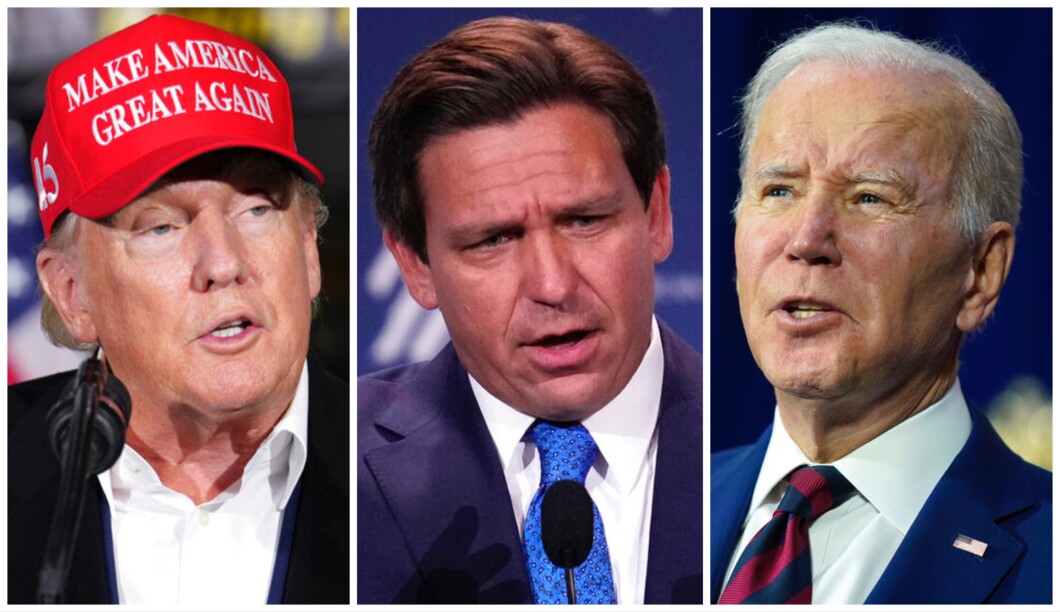
The Supreme Court’s Dobbs v. Jackson Women’s Health Organization decision continues to reshape American politics one year after an infamous leak alerted the public that big changes to abortion policy could be coming.
President Joe Biden, former President Donald Trump, and presumed challenger Gov. Ron DeSantis (R-FL) have taken sharply diverging stances on abortion, each betting theirs will win the day with voters.
HOW BIDEN’S REELECTION CAMPAIGN COULD ALLOW WHITE HOUSE TO DODGE MORE QUESTIONS
“Congress must restore the right that was taken away in Roe v. Wade — and protect Roe v. Wade,” Biden said to applause at February’s State of the Union address. “Give every woman the constitutional right. The vice president and I are doing everything to protect access to reproductive healthcare and safeguard patient safety.”
The Dobbs majority opinion leaked on May 2, 2022, and was confirmed by the Supreme Court the next month, ending a 50-year battle among conservatives and sending abortion policy back to the states. That’s created a new political dynamic untested in presidential politics since 1972, with the executive branch now able to weigh in directly.
Biden has taken the Democratic Party’s pro-abortion rights position of the last few decades, articulated on the midterm campaign trail, and Vice President Kamala Harris in particular has stumped for abortion rights since the decision came down.
But the outlook is trickier on the Right.
Trump, who forged an uneasy alliance with evangelicals en route to winning in 2016, has since kept his distance by embracing a hands-off “states right” stance.

That’s landed him in hot water with the anti-abortion community, which includes many evangelicals.
Susan B. Anthony Pro-Life America President Marjorie Dannenfelser called Trump’s position “morally indefensible,” saying, “We will oppose any presidential candidate who refuses to embrace at a minimum a 15-week national standard to stop painful late-term abortions while allowing states to enact further protections.”
Likewise, Live Action President Lila Rose said Trump “disqualified” himself with the stance. He’s likely betting it won’t hurt him with primary voters, argues Colby College politics professor Sandy Maisel, and will be more favorable in the general election.
However, Maisel thinks that strategy could backfire.
“In 2017 and 2021, I talked to a lot of evangelicals about why they were still for Trump, and it was all about the abortion issue,” he said. “Once he gets on the debate stage, I think he’ll get boxed in on the abortion issue. He can’t be less pro-life than the other candidates for his constituents.”
Maisel also says the Dobbs decision benefits Democrats generally more than Republicans, citing polls that say their position is shared by 60% of voters and the lack of consensus among GOP candidates. Trump himself has blamed Dobbs for Republicans’ poor showing in the 2022 midterm elections.
DeSantis, by contrast, has taken a hard-line stance, signing a six-week abortion ban into law with the help of Florida’s Republian supermajority. The White House immediately denounced the move, but it could benefit DeSantis politically as he tries to make up a polling deficit with Trump.
“DeSantis can use this to pick up all the crazies that support Trump,” Florida-based Democratic strategist Sasha Tirador said. “It’s one thing to be conservative, one thing to be against abortion. Then there’s the extreme crazies. Unfortunately, you can’t win a primary without them in the Republican Party. ”
But Tirador predicts that support will backfire on Republicans in the general election, saying even many GOP voters don’t support six-week abortion bans.
CLICK HERE TO READ MORE FROM THE WASHINGTON EXAMINER
DeSantis could theoretically pivot toward the center after securing the nomination, saying the issue should be up to the states rather than the federal government, but that may risk alienating both moderates and the conservative base.
A Reuters-Ipsos poll conducted in April found that half of respondents strongly or somewhat oppose a national six-week abortion ban, which includes 44% of Republicans. According to the same poll, 43% of Republicans were less likely to vote for a politician limiting abortion access.





